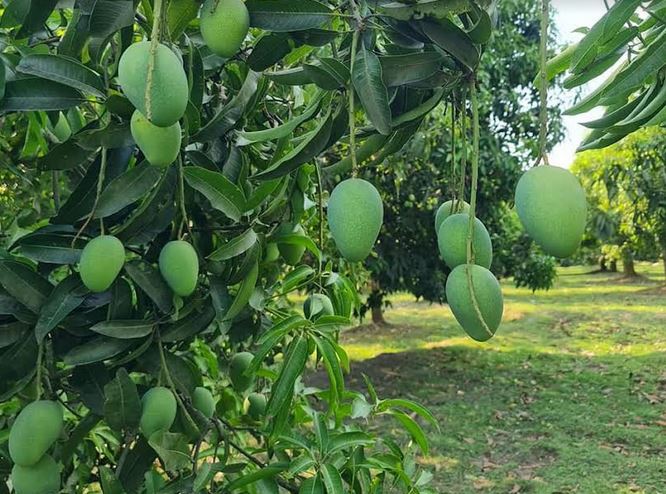
By Dr Aynal Haque
RAJSHAHI, June 28, 2024 (BSS) - Instead of the previous single cropping pattern, the vast Barind tract has started becoming hubs of farming diversified crops, including some of the high-valued ones, during the last couple of years.
Currently, various vegetables, crops and fruits, particularly mango, orange, malta, dragon and guava, are being cultivated in the areas massively.
Large-scale promotion of diversified crops farming can be the best ways of ensuring water security in the drought-prone Barind area, said experts and development workers.
Since ancient times, the Barind area has been drought-prone due to its geographic location but the farmers used to cultivate diversified crops to cope with the water-stressed condition. They also meet up their water demands from the natural water bodies like rivers, canals and ponds.
Prof Chowdhury Sarwar Jahan of the Department of Geology and Mining at Rajshahi University said the natural surface water resources are facing an endangered condition at present due to multifarious reasons.
In this situation, farmers have become dependent on groundwater for irrigating the farming fields, especially the Irri-Boro paddy which is the highly irrigation-consumed crop.
Prof Sarwar Jahan, however, opined that water is being adjudged as one of the vital sources in the transformation process of development of the present barind area besides making it green during the last couple of decades.
Lifting of underground water must be reduced to the minimum as the future of agriculture depends on availability of water amid a formidable threat of climate change when there is an alternative to keeping food production rate increasing.
He said there should be nature-based solutions for water challenges in the region. Emphasis should be laid on the need for integrated solutions in water development plans considering political, social and local realities.
Apart from this, emphasis should be given to the cultivation of drought-tolerant crops instead of depending on only Irri-Boro farming in the area to lessen the gradually mounting pressure on underground water.
Large-scale promotion of less-water consuming indigenous crops could be the effective means of mitigating water-stress conditions in the drought-prone Barind area.
Narrating the sufferings caused by the abnormal lowering of groundwater National Agriculture Award Winning Farmer Nur Muhammad mentioned that there are enormous scopes of increasing the acreage of various low-water consuming crops like gram, wheat, maize, lentil, burley and chickpea in the Barind tract.
He mentioned that the ongoing climate change at alarming rates has severely affected indigenous crops farming and its diversity creating a real threat to food production.
There is no alternative to encourage the farmers to promote various cereal crops and vegetables instead of only Irri-Boro paddy on the dried land to face the water stress condition as its groundwater table has gradually been declining.
Muhammad said legitimate rights of the farmers and others concerned should be protected for encouraging them towards boosting agricultural productions to meet up its gradually mounting demands.
Shahidul Islam, Coordinator (Barind Region) of Bangladesh Resource Centre for Indigenous Knowledge (BARCIK) said utmost emphasis should be given on practicing sustainable agriculture to attain the sustainable development besides achieving the sustainable development goals.
Simultaneously, species of diversified crops need to be protected which is the precondition to sustainable development.
Ensuring water security is very important to ensure food security and biodiversity and sustainable culture.
Existing adverse impacts of climate change and other natural catastrophes are posing a serious threat to biodiversity, health security and water security in the Barind area.
More than 12.58 lakh community people of 2.66 lakh households are being motivated and encouraged towards promotion of less-water consuming crops to reduce the pressure on underground water in eight upazilas of Rajshahi, Naogaon and Chapainawabganj districts.
The existing adverse impact of climate change is putting local people into trouble since the hand-driven tube-wells are not functioning here in the dry season, he added.